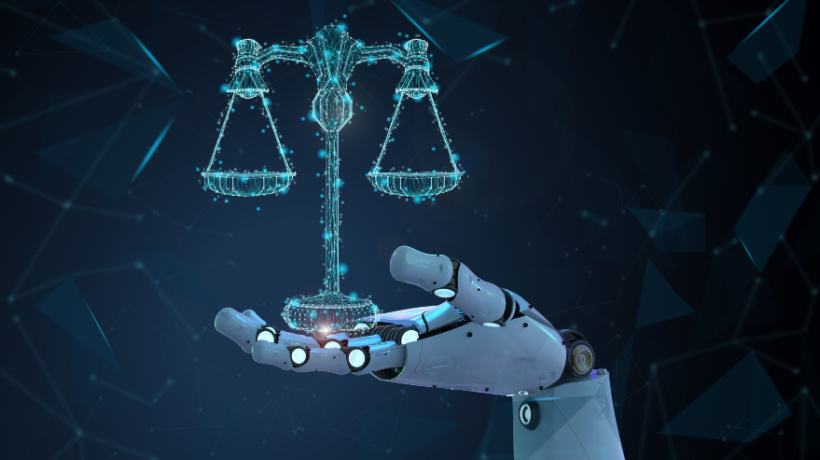
Artificial intelligence (AI) has rapidly penetrated various sectors, and the legal industry is no exception. The intersection of AI and law presents numerous opportunities and challenges, transforming traditional legal practices into more efficient and innovative processes. This article explores the key opportunities AI offers in the legal field while also addressing the main challenges that come with its implementation.
Key Opportunities AI Presents in the Field of Law
Enhanced Legal Research Capabilities
One of the most significant advantages of AI in law is its ability to enhance legal research capabilities. AI-powered tools can sift through vast amounts of case law, statutes, and legal documents in a fraction of the time it would take a human. By doing so, these tools allow for more efficient and accurate analysis. This not only saves time but also ensures that lawyers have access to the most relevant and up-to-date information to support their cases.
Automation of Routine Tasks
AI can automate many routine tasks in the legal profession, such as contract review and drafting. These tasks, which often require a considerable amount of time and attention to detail, can be streamlined using AI technologies. By automating these processes, lawyers are freed up to focus on more complex and high-value work, such as strategizing for cases and providing personalized client consultations.
Improved Prediction of Case Outcomes
Another key opportunity AI offers is improved prediction of case outcomes. AI-powered analytics can analyze past case data, identify patterns, and predict the likely outcomes of current cases. This capability is invaluable for lawyers when developing legal strategies and advising clients. By having a clearer understanding of potential outcomes, lawyers can make more informed decisions and better manage client expectations.
Increased Access to Justice
AI technology also has the potential to increase access to justice for underserved populations. Tools like chatbots can provide legal information and support to individuals who may not have the resources to hire a lawyer. These AI-driven tools can answer common legal questions, guide users through legal processes, and even assist with document preparation. By making legal assistance more accessible, AI can help bridge the justice gap and ensure that more people receive the support they need.
Main Challenges AI Faces in the Legal Industry
Legal and Ethical Concerns
Despite the numerous opportunities, AI in the legal field also faces several challenges. One of the primary concerns is the legal and ethical implications of using AI in decision-making. Issues of transparency, bias, and accountability arise when AI systems are used to make or influence legal decisions. Ensuring that AI tools operate fairly and ethically is crucial to maintaining trust in the legal system.
Resistance to Change
The legal profession is known for its resistance to change, and the adoption of AI is no exception. Many lawyers are concerned about job displacement and the devaluation of traditional legal skills. There is a fear that AI will replace human lawyers, leading to job losses and a reduced need for human expertise. Overcoming this resistance requires a shift in mindset, emphasizing that AI is a tool to augment, rather than replace, human capabilities.
High Implementation Costs
The high cost of implementing AI technologies is another significant barrier, particularly for smaller law firms and underserved communities. Developing and integrating AI systems can be expensive, requiring substantial investment in both technology and training. This can create a disparity between larger firms that can afford to invest in AI and smaller firms that may struggle to keep up.
Need for Regulation and Standards
The rapid advancement of AI in law calls for regulation and standards to govern its use. Ensuring that AI systems comply with legal and ethical norms is essential for maintaining the integrity of the legal profession. Establishing clear guidelines and standards for AI implementation can help mitigate risks and ensure that AI is used responsibly and effectively.
Data Privacy and Security Concerns
Data privacy and security are critical concerns when it comes to AI in the legal field. The collection and use of sensitive legal information in AI systems raise questions about how this data is protected. Ensuring robust data privacy and security measures is essential to prevent breaches and protect client confidentiality.
Integration into Existing Workflows
Integrating AI tools into existing legal workflows is another challenge. Law firms must adapt their processes to incorporate AI technologies seamlessly. This requires not only technological adjustments but also changes in how lawyers work and interact with AI systems. Ensuring a smooth integration is essential for maximizing the benefits of AI without disrupting daily operations.
Conclusion
The intersection of AI and law offers a wealth of opportunities to enhance efficiency, improve decision-making, and increase access to justice. However, these opportunities come with challenges that must be addressed to ensure the responsible and ethical use of AI in the legal field. By navigating these challenges and leveraging the potential of AI, the legal industry can continue to evolve and provide better services to clients and society as a whole.
If you’re interested in learning more about how AI can transform your legal practice, consider signing up for Jasper. Our advanced AI tools are designed to help you streamline your workflows, enhance your research capabilities, and provide the best possible outcomes for your clients. Learn more today!
FAQs
What are the primary benefits of AI in legal research?
AI enhances legal research by efficiently analyzing vast amounts of case law and statutes, ensuring more accurate and up-to-date information.
Can AI technology replace human lawyers?
No, AI is designed to augment human capabilities, automating routine tasks and allowing lawyers to focus on complex, high-value work.
How does AI improve access to justice?
AI tools like chatbots provide legal information and support to underserved populations, making legal assistance more accessible.
What are the main ethical concerns with AI in law?
Key ethical concerns include transparency, bias, and accountability in AI decision-making processes.
Is AI technology affordable for small law firms?
While the initial implementation costs can be high, there are scalable AI solutions available that can be tailored to fit the budget of smaller law firms.









